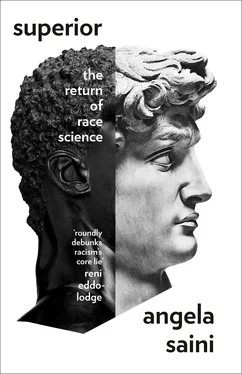Through objects like this you can understand how power balances shift throughout history. They reveal a less simple version of the past, of who we are. And it’s one that demands humility, warning us that power is fleeting. More importantly, they show that knowledge is not just an honest account of what we know, but has to be seen as something manipulated by those who happen to hold power when it is written.
The Ancient Egypt galleries of the British Museum are always the most crowded. As we walk past the ancient mummies in their glittering cases we don’t always recognise that this is also a mausoleum. We’re surrounded by the skeletons of real people who lived in a civilisation no less remarkable than the ones that followed or that went before. Every society that happens to be dominant comes to think of itself as being the best, deep down. The more powerful we become, the more our power begins to be framed as not only cultural but natural. We portray our enemies as ugly foreigners and our subordinates as inferior. We invent hierarchies, give meaning to our own categories. One day, a thousand years forward, in another museum, in another nation, these could be European bones encased in glass, what was once considered an advanced society replaced by a new one. A hundred years is nothing; everything can change within a millennium. No region or people has a claim on superiority.
Race is the counter-argument. Race is at its heart the belief that we are born different, deep inside our bodies, perhaps even in character and intellect, as well as in outward appearance. It’s the notion that groups of people have certain innate qualities that are not only visible at the surface of their skins, but are intrinsic to their physical and mental capacities, that perhaps even help define the passage of progress, the success and failure of the nations our ancestors came from.
Notions of superiority and inferiority impact us in deep ways. I was told of an elderly man in Bangalore, south India, who ate his chapatis with a knife and fork because this was how the British ate. When my great-grandfather fought in the First World War for the British Empire and when my grandfather fought in the Second World War, their contributions were forgotten, like those of countless other Indian soldiers. They were considered not strictly equal to their white British counterparts. This is how it was. Generations of people in the twentieth century lived under colonial rule, apartheid and segregation, suffered violent racism and discrimination, because this is how it was. When boys from my school threw rocks at my sister and me when we were little, telling us to go home, this is how it was. I knew even as I bled that this is how it was. This is how it still is for many.
Race, shaped by power, has acquired a power of its own. We have so absorbed our classifications – the trend begun by scientists like Blumenbach – that we happily classify ourselves. Many of those who visit the British Museum for the first time (I can tell you this from having spent hours watching them) come searching for their own place in these galleries. The Chinese tourists go straight to the Tang dynasty artefacts; the Greeks to the Parthenon marbles. The first time I came here, I made a beeline for the Indian galleries. My parents were born in India, as were their parents, and theirs before them, so this is where I imagined I would find the objects most relevant to my personal history. So many visitors have that same desire to know who their ancestors were, to know what their people achieved. We want to see ourselves in the past, forgetting that everything in the museum belongs to us all as human beings. We are each products of it all.
But, of course, that’s not the lesson we take, because that’s not what the museum was designed to tell us. Trapped inside glass cabinets, fixed to the floors, why are these objects in these rooms, and not where they were first made? Why do they live inside this museum in London, its neo-classical columns stretching into the wet, grey sky? Why are the bones of Africans here, and not where they were buried, in the magnificent tombs that were created for them, where they were supposed to live out eternity?
Because this is how power works. It takes, it claims and it keeps. It makes you believe that this is where they belong. It’s designed to put you in your place.
The global power balance, as it played out in the eighteenth century, meant that treasures from all over the world could and would only end up in a museum like this, because Britain was one of the strongest nations at the time. It and other European powers were the latest colonisers, the most recent winners. So they gave themselves the right to take things. They gave themselves the right to document history their way, to define the scientific facts about humankind. European thinkers told us that their cultures were better, that they were the proprietors of thought and reason, and they married this with the notion that they belonged to a superior race. These became our realities.
The truth is something else.
Конец ознакомительного фрагмента.
Текст предоставлен ООО «ЛитРес».
Прочитайте эту книгу целиком, купив полную легальную версию на ЛитРес.
Безопасно оплатить книгу можно банковской картой Visa, MasterCard, Maestro, со счета мобильного телефона, с платежного терминала, в салоне МТС или Связной, через PayPal, WebMoney, Яндекс.Деньги, QIWI Кошелек, бонусными картами или другим удобным Вам способом.












